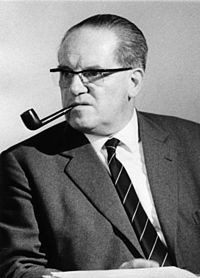Herbert Wehner
| Herbert Wehner | |
|---|---|

Iconic portrait of Minister Herbert Wehner in 1966, with his pipe
|
|
| Federal Minister of Intra-German Relations | |
|
In office 1966–1969 |
|
| Chancellor | Kurt Georg Kiesinger |
| Preceded by | Johann Baptist Gradl |
| Succeeded by | Egon Franke |
| Member of the Bundestag | |
|
In office 1949–1983 |
|
| President |
Karl Arnold (1949, acting) Theodor Heuss (1949-1959) Heinrich Lübke (1959-1969) Gustav Heinemann (1969-1974) Walter Scheel (1974-1979) Karl Carstens (1979-1983) |
| Chancellor |
Konrad Adenauer (1949-1963) Ludwig Erhard (1963-1966) Kurt G. Kiesinger (1966-1969) Willy Brandt (1969-1974) Helmut Schmidt (1974-1982) Helmut Kohl (1982-1983) |
| Chairman of parliamentary group of SPD | |
|
In office 1969–1983 |
|
| Chancellor |
Willy Brandt (1969-1974) Helmut Schmidt (1974-1982) Helmut Kohl (1982-1983) |
| Preceded by | Helmut Schmidt |
| Succeeded by | Hans-Jochen Vogel |
| Personal details | |
| Born |
July 11, 1906 Dresden, Saxony German Empire |
| Died | January 19, 1990 (aged 83) Bonn, North-Rhine Westphalia West Germany |
| Nationality |
|
| Political party | Social Democratic Party |
| Spouse(s) | 1.Lotte Loebinger (1927–1999); 2. Lotte Burmester (* - 1979); 3. Greta Burmester (daughter of 2.) |
| Religion | Lutheran |
Herbert Richard Wehner (11 July 1906 – 19 January 1990) was a German politician. A former member of the Communist Party, he joined the Social Democrats (SPD) after World War II. He served as Federal Minister of Intra-German Relations from 1966 to 1969 and thereafter as chairman of the SPD parliamentary group in the Bundestag until 1983.
During his tenure in the Bundestag from 1949 to 1983, Wehner became (in-)famous for his caustic rhetoric and heckling style, often hurling personal insults at MPs with whom he disagreed. He holds the record for official censures (77 by one count, 78 or 79 by others) handed down by the presiding officer.
Herbert Wehner was born in Dresden, the son of a shoemaker. His father was active in his trade union and a member of the Social Democratic Party. More radical than his father, Wehner engaged in anarcho-syndicalist circles around Erich Mühsam, driven by the 1923 invasion of Reichswehr troops into the Free State of Saxony at the behest of the DVP–SPD Reich government of Chancellor Gustav Stresemann. He also fell out with Mühsam, whose pacifist manners he rejected, and finally joined the Communist Party of Germany (KPD) in 1927, becoming an official of the party's Rote Hilfe organisation the same year.
Wehner rose quickly and was elected to the Landtag state legislature of Saxony in 1930. Nevertheless, he resigned one year later to work at the KPD politburo in Berlin with Walter Ulbricht. After Hitler's seizure of power in January 1933, he participated in the communist resistance against the Nazi regime from the Saar Protectorate. When the Saar was re-incorporated in 1935, Wehner went into exile, first to Paris, then in 1937 to Moscow, where he lived at Hotel Lux, wrote for the Deutsche Zentral Zeitung and had to face Joseph Stalin's Great Purge of 1937-38. After Wehner's death, German news magazine Der Spiegel magazine documented accusations that he informed the NKVD on several party fellows like Hugo Eberlein, presumably to save his own life. After being sent to neutral Sweden in 1941 in order to re-enter Germany, he was arrested at and interned for espionage in 1942. If he deliberately went into custody has not been conclusively established, at least he was excluded from the Communist Party by politburo chief Wilhelm Pieck.
...
Wikipedia
